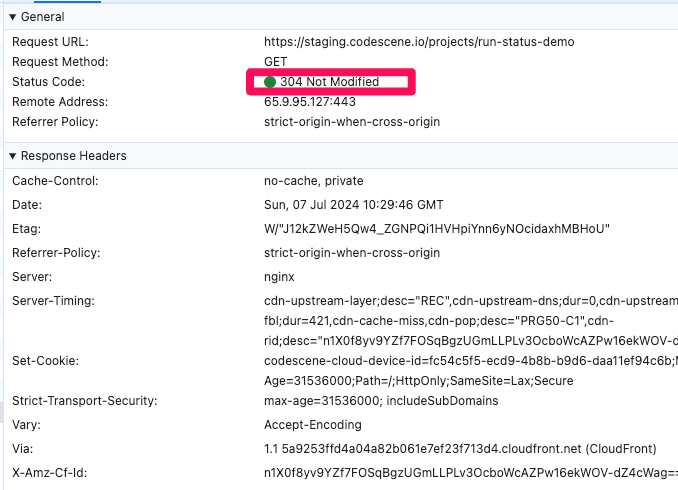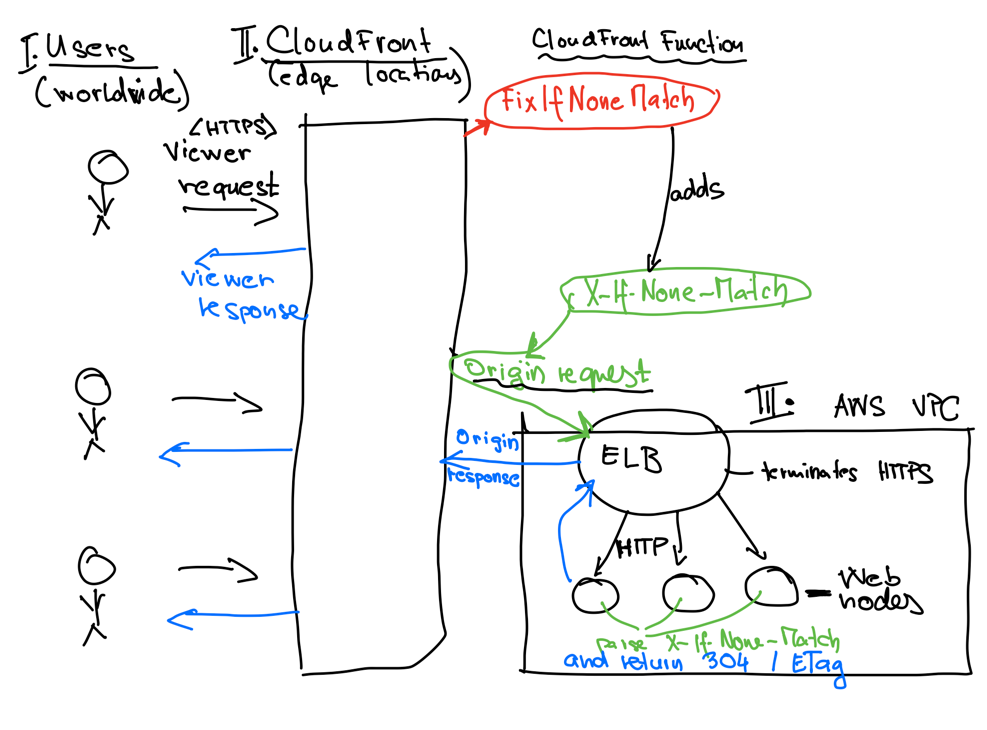CloudFront distribution -> ELB (terminates HTTPS) -> Web node (nginx) -> Web node (app HTTP server)CloudFront: the mysterious case of a missing If-None-Match header
For months, we’ve been suffering from mediocre performance of part of our website (codescene.io) due to inability to effectively cache expensive page loads. A large part of it was a problem with CloudFront I discovered in December 2023 after conversation with the AWS Support team. Here’s a story of solving this problem.
TL;DR:
unfortunately at this time CloudFront does not currently support 'Conditional' requests when CloudFront is configured to to forward cookies. "If-Modified-Since and If-None-Match conditional requests are not supported when CloudFront is configured to forward cookies (all or a subset)."
TL;DR: Solution
I created a CloudFront function that parses If-None-Match header in the viewer’s request
and passes it to the origin server by copying the value into a custom X-If-None-Match header.
I modified the backend app to check both of these headers and return a cached response (304)
if the etag matches the current app state.
WHAT?!?
The above statement from AWS support was quite surprising: If-None-Match is a standard HTTP header and it’s often used to skip expensive computation on the server if the client already has an up to date version of the resource. An HTTP request is still made but the server can skip any extra processing and just return a pre-computed result presumably stored in a cache.
It sounds ridiculous that CloudFront (being a CDN) has no support for this very common technique.
WHERE & HOW (projects page and introducing ETag-based caching)
We had some serious problems with the performance of our projects dashboard (codescene.io/projects) so we tried to optimize it. We tuned DB queries and we introduced caching via ETag-s.
It looked quite good and, it seemed, we were able to skip some expensive processing by caching projects page data in Redis and reusing it for subsequent requests for the same user/account. The tests looked promising and we were observing expected 304 responses (confirmed by inspecting networking traffic in the Browser console).
Interlude: the webapp deployment architecture
The deployment of our webapp isn’t very complicated.
It uses CloudFront as the front layer, then an elastic load balancer (ELB) which terminates HTTPS and proxies the traffic (plain HTTP) to the origin server running nginx (for static content) which finally proxies the requests for the dynamic content to an application HTTP server running on the same node:
BUT (confused observer)
The DB load wasn’t significantly decreasing and monitoring of real /projects page requests didn’t reveal any big improvements. How was that possible? Shouldn’t caching improve it a lot, especially if it’s the same user having the /projects page open for a long time? (the page is polling the server in regular intervals so over time we would see a lot of requests from people, until they close the page)
The responses looked good from the client’s point of view (getting 304):

I was puzzled so I eventually looked into logs. The access logs on the origin server didn’t look as good: we were returning 200 responses instead! That meant we are doing all the expensive computation (DB queries) we were supposed to avoid - notice the response code 200 just after the "GET …":
10.0.0.217 - - [09/Jul/2024:04:14:18 +0000] "GET /projects/run-status-demo HTTP/1.1" 200 146 2.420 "https://codescene.io/demo-projects" "Mozilla/5.0 (Macintosh; Intel Mac OS X 10_15_7) AppleWebKit/537.36 (KHTML, like Gecko) Chrome/126.0.0.0 Safari/537.36" "86.49.232.245, 64.252.87.167"CloudFront was not only working as expected, it was also hiding the problem from us and pretending it all worked!
tcpdump-ing
Still confused, I turned to tcpdump to get the details about HTTP requests. The deployment architecture of our app is simple:
I run tcpdump on the web node and was able to observe the content since it’s pure HTTP at that point:
ip-10-0-4-99.eu-west-1.compute.internal.gw > ip-10-0-3-215.eu-west-1.compute.internal.http: Flags [P.], cksum 0xc665 (correct), seq 2212:4034, ack 457, win 424, options [nop,nop,TS val 1507972921 ecr 1504231166], length 1822: HTTP, length: 1822
GET /projects/run-status-demo HTTP/1.1
host: staging.codescene.io
Accept: application/json
Accept-Encoding: br,gzip
Accept-Language: en
CloudFront-Forwarded-Proto: https
... # other headersI removed a bunch of headers above, but the key point was that the If-None-Match header wasn’t present at all.
To confirm that I’m not missing anything obvious, I passed the ETag header returned previously by the server manually using curl (on the web node) and observed it indeed returned 304:
curl -H'If-None-Match: W/"z4BhKskgZrcVMokz7qzV0KTfA5foJ2wJHB8tcXDQIGQ"' -v localhost:80/projects/run-status-4f-demo
* Trying 127.0.0.1...
* TCP_NODELAY set
* Connected to localhost (127.0.0.1) port 80 (#0)
> GET /projects/run-status-4f-demo HTTP/1.1
> Host: localhost
> User-Agent: curl/7.61.1
> Accept: */*
> If-None-Match: W/"z4BhKskgZrcVMokz7qzV0KTfA5foJ2wJHB8tcXDQIGQ"
>
< HTTP/1.1 304 Not Modified
< Server: nginx
< Date: Mon, 04 Dec 2023 20:47:38 GMT
...
< Cache-Control: no-cache, private
< ETag: W/"z4BhKskgZrcVMokz7qzV0KTfA5foJ2wJHB8tcXDQIGQ"
...WHY (AWS Support rendezvous)
I was unable to explain this behavior so I decided to contact AWS support. After a lot of back and forth, I got this information from them (quoted at the beginning of the article):
unfortunately at this time CloudFront does not currently support 'Conditional' requests when CloudFront is configured to to forward cookies. "If-Modified-Since and If-None-Match conditional requests are not supported when CloudFront is configured to forward cookies (all or a subset)."
I hardly believe them at all - is it really the case that they do not support such a foundational caching pattern?
I tried to dig deeper and find a fix but it lead to nowhere. Eventually, I had to focus on another stuff and this problem got down-prioritized.
THEN (If you didn’t fix it, it’s ain’t fixed)
Several months passed by and we were having serious issues with the projects page again. I remembered my old struggles so I reached out to AWS support again - if nothing else, they should confirm the root cause. Or maybe they will suggest a proper solution this time?
No surprise, unfortunately - it took a while to get the information but they finally confirmed this is CloudFront’s intended behavior. They promised to add this to the team’s backlog but there’s little chance they will do anything about it.
This reminds, one more time, that if you ignore problems they will come back. The "if you didn’t fix it, it ain’t fixed" phrase comes from my all-time favorite book DEBUGGING by David J Agans
HENCE (rolling sleeves up)
Seeing no option to solve this I was becoming desperate. How can I fix this damn thing?! Do I need to wait for the CloudFront team (possibly ad infinitum) until they make it possible?
Fortunately, I got an idea: If Cloudfront is receiving but not passing the If-None-Match header then maybe I can copy its value into a custom header and pass that instead?!? I remembered I did something similar with Lambda@Edge function (adding a few security headers to all responses) years ago.
WHAT (CloudFront function)
After looking around, it seems that using a CloudFront function might be better - they are simpler, faster, and cheaper. A quick experiment on staging and I was able to confirm it works (on our staging).
The function code looks straightforward - if there’s 'if-none-match' header in the request data, then its value is copied into the 'x-if-none-match' header and the updated request is returned (that means it’s passed to the origin).
function handler(event) {
var request = event.request;
// CloudFront converts headers to lowercase - see https://docs.aws.amazon.com/AmazonCloudFront/latest/DeveloperGuide/functions-event-structure.html#functions-event-structure-headers
var ifNoneMatchHeader = request.headers['if-none-match'] && request.headers['if-none-match'].value;
if (ifNoneMatchHeader) {
// add a special header which won't be removed by CloudFront when passing request to the origin
console.log('Setting x-if-none-match with the following value:' + ifNoneMatchHeader);
request.headers['x-if-none-match'] = {value: ifNoneMatchHeader};
}
return request;
}Of course, I also had to modify our application code to check the x-if-none-match header. Here’s a simplified version of the code to extract ETag from the request:
(defn request-etag
"Extracts ETag value from the request.
Presumably, this is stored in the 'if-none-match' header,
but in case CloudFront is used, we must use 'x-if-none-match' header instead;
that's our custom header populated by the FixIfNoneMatch CloudFront function.
If both headers are present (unlikely) then 'x-if-none-match' takes precedence."
([req]
(request-etag req true))
([{:keys [headers] :as _req} unwrap-weak-etag-prefix?]
(let [etag (get headers "if-none-match"
(get headers "x-if-none-match"))]
etag)))Seeing is believing
Using my favorite tcpdump again, I can confirm that the X-If-None-Match header is passed properly.
ip-10-0-4-99.eu-west-1.compute.internal.46404 > ip-10-0-3-215.eu-west-1.compute.internal.http: Flags [P.], cksum 0x5f82 (correct), seq 1019078678:1019080668, ack 3054198987, win 106, options [nop,nop,TS val 1661233707 ecr 1657467710], length 1990: HTT
P, length: 1990
GET /projects/run-status HTTP/1.1
...
X-If-None-Match: W/"jEzxfw64HBU1CYpd28HQiKhV-hlSMGCnfz6K3JpEdZk"We are done here!
Solution Architecture
This is a high-level sketch of the important components and how they play together.
The crucial piece is the FixIfNoneMatch CloudFront function that adds the X-If-None-Match header to the origin request.

Or check the PDF version.